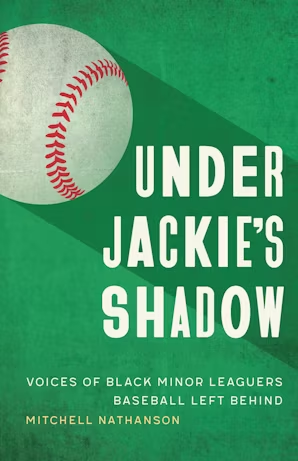Voices of Black Minor Leaguers Baseball Left Behind
By Mitchell Nathanson
This book is written after many interviews with black baseball players that never got the credit or chance to play major league baseball. This was after Jackie Robinson was brought in to play by Branch Rickey. The feelings were still prevalent throughout baseball that black players didn’t belong.Through these remarkable intere\views and0 stories conduct by the author, Mitchell Nathanson,
This is a collection of tales by the men who lived the awful and many times hateful experience of racism in major league baseball. Black men who spent their professional lives in the minor leagues. Most never seeing a major league clubhouse. We get the clear picture about how the scouts, front office. personnel including the general managers. really felt about black players. What they did and how they were duped many times into believing they were on the cusp of the major leagues.
Mickey Bowers grew up as the son of a military sergeant that moved where he was needed. In the late 1950’s Mickey found himself on a military base in Germany. There were no television or radio ties to the United States. Therefore, Mickey was isolated from what was really happening in the United States. He had no clue as to how Negros were being treated in the USA. In Germany, all the kids on the base did things together. It didn’t matter if their skin was white o black. No one showed any biases on the base.
He states that he never had any prejudicial treatment until he signed with the Philadelphia Phillies and all that changed. Mickey had speed and a decent bat and Dallas Green signed him to play outfield. He had never played there in his life but was assured all was good and he could learn the position. Bowers said it was hard in right field with the spin of the ball coming off the bat.
He had a bad arm and they chose not to do anything about it as he could be replaced with another low paying black at any time.All this talk just sucked the life out of him for enjoying baseball and when he was released, Mickey decided to move on from baseball.
Edgar Pate had a similar stories to tell such as living on a base and never knowing what prejudice really was. But when he got sent south to play ball. He couldn’t get an apartment. Order a hamburger at most joints or even live near the ballpark.
He was released at age 24 after his third year because hey wanted a you movement in the
Mets organization. He went on to say:
“Baseball wasn’t a good experience for me at all. It just wasn’t. We say baseball is 90 percent mental and I see exactly what it means. It’s a hundred percent mental as far as I am concerned because everything was mental, everything that was done wrong was mental.It wasn’t physical. Being from a middle class family, I knew I had talent to do other things so I finally said this is just not worth it to me.”
There was a lot of work that went into these interview for this author . In fact, There were a dozen interviews for this book. I am not going to give all of them to you. Others were Milt Kelly, Moe Hill, Leroy Reams, Aaron Pointer, Ron Allen, Robert Kelly, Roland Hardson, John Thomson,Glenn Sterling and Chuck Rowe. This book is worth reading and had many eye opening statements. Some of these events happened as late as the 1980’s.
The book is worth having and worth owning for your sports bookshelf.The author. Mitchell Nathanson is a professor of law At Villanova University and the author of several books including Bouton, the Life of a Baseball Original. God Almighty Himself: The Legacy of Dick Allen and A People’s History of Baseball
This book is 168 pages with an easy read and comfortable style would like to thank the University of Nebraska Press for sending the book to me for a fair and honest review.
Review done by Tom Knuppel



